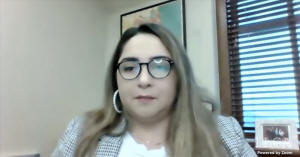COVID-19 housing bill aims to provide additional support to renters,
homeowners
 Send a link to a friend
Send a link to a friend
[March 18, 2021]
By TIM KIRSININKAS
Capitol News Illinois
tkirsininkas@capitolnewsillinois.com
 SPRINGFIELD – State Rep. Delia Ramirez,
D-Chicago, reintroduced a bill on Wednesday that would offer emergency
support to tenants, landlords and homeowners struggling to make payments
in the midst of the COVID-19 pandemic. SPRINGFIELD – State Rep. Delia Ramirez,
D-Chicago, reintroduced a bill on Wednesday that would offer emergency
support to tenants, landlords and homeowners struggling to make payments
in the midst of the COVID-19 pandemic.
House Bill 2877, known as the Federal Emergency Rental Assistance Act,
would create a process for allocating funding for rental support that
was made available in federal stimulus packages since December. It would
also expand the sealing of eviction records in the state through July of
2022.
Ramirez, who previously introduced the legislation during the lame duck
session in January, said the new bill offers “a comprehensive approach”
to addressing what she referred to as “a crisis of housing instability”
as a result of COVID-19.

Since the outset of the pandemic, Ramirez has been working to introduce
legislation that would provide additional support to renters, landlords
and homeowners who are unable to make rent or pay their mortgage due to
financial hardship during the pandemic.
The legislation Ramirez originally introduced in January aimed to back
Gov. JB Pritzker’s eviction moratorium by enshrining the executive order
into state statute and extending it into late 2022.
“Since January, we've been working really hard to make some technical
changes to address concerns from opponents in the finance industry,”
Ramirez said. “We have now come to an agreement.”
Ramirez and proponents of the legislation said the new version would
primarily aim to protect rental tenants from additional financial
hardship if faced with an eviction notice.
Emily Coffey, a housing attorney with the Shriver Center on Poverty Law,
called the bill a “vital step in the right direction” to offer support
to tenants, landlords, and homeowners.
“The COVID-19 pandemic has exposed a housing crisis that has long
existed, but became all the more urgent to address,” Coffey said.
“(The bill) ensures that tenants who are unable to pay their rent do not
have lasting permanent consequences, and that landlords are able to
access a rental assistance fund,” she added. “The bill also ensures that
homeowners and small landlords have additional time to avoid
foreclosure.”

Opponents of the bill, including State Rep. Deanne Mazzochi, R-Elmhurst,
cited concerns that the legislation does not require a written lease to
apply for additional rental support, which she argued could lead to
fraudulent claims.
“That failure to have some type of two factor authentication for someone
without a written lease, I think, is going to be an invitation to
fraud,” Mazzochi said.
[to top of second column]
|

State Rep. Delia Ramirez, D-Chicago, introduces House
Bill 2877, the Federal Emergency Rental Assistance Program Act,
during a virtual Housing Committee Hearing Wednesday. (Credit:
ilga.gov)

Ramirez responded that in order to attain additional rental
assistance in accordance with federal requirements, residents would
have to provide written documents proving their residency that their
landlord would need to sign.
Ramirez also said the U.S. Treasury Department was clearer on
eligibility requirements in the latest COVID relief package,
allowing the state to ensure that residents who most need rental
support would be the ones receiving it.
“The federal government will be auditing the administering agencies
to ensure they're living up to the federal guidelines,” Ramirez
said.
Ramirez said that new stipulations from the federal government
focusing on Area Median Income data from the U.S. Housing and Urban
Development data would also allow the state to ensure that rental
relief is going to those who need the most support.
“Those that need it the most are able to access this assistance, and
we can prevent people from becoming homeless,” Ramirez said.
HB 2877 was advanced to the house floor with support from only
Democrats.
The bill was one of three advanced by the House Housing Committee
Wednesday.
The other two bills would aim to give additional rental support to
low-income individuals and those living with mental illness.

House Bill 449, introduced by Rep. Kathleen Willis, D-Addison, would
create a “Housing is Recovery” pilot program. The five-year pilot
program would offer bridge rental subsidies to those who are at high
risk of unnecessary institutionalization and overdoses related to
mental illness.
House Bill 648, introduced by Rep. Denyse Stoneback, D-Skokie, would
establish new, more flexible rules for family median income level
requirements in order to qualify for subsidized housing.
The bill as amended would allow residents to qualify for subsidized
housing through the state’s Rental Housing Support program if their
household income is at or below 30 percent of their Area Median
Income.
“More assistance is on the way, but we must do more to ensure
continued housing stability for the people of our state,” Stoneback
said of the bill.
Both HB 449 and HB 648 passed committee by a unanimous vote.
Capitol News Illinois is a nonprofit, nonpartisan
news service covering state government and distributed to more than
400 newspapers statewide. It is funded primarily by the Illinois
Press Foundation and the Robert R. McCormick Foundation.
 |